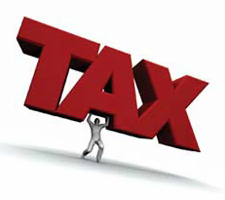
Labour Party Led Government Seeks To Impose New Tax
Basseterre, St. Kitts – Nevis
October 22, 2010 (CUOPM)
Legislation making provisions for the imposition and collection of an unincorporated business tax in St. Kitts and Nevis will be debated when the Federation’s lawmaking body meets next week.
The Unincorporated Business Tax Bill is primarily a result or product of the tax reform process initiated by the Government in order to reform St. Kitts and Nevis’ tax regime.
Part 1 of the Bill seeks to provide for matters of a preliminary nature, that is to say, the short title of the Bill, application of the Bill, and the interpretation of certain words and terminologies used in the Bill.
It states that this Act does not apply to a company registered under the Companies Act and a partnership which is treated as a company for purposes of the Income Tax Act, Cap. 20. 22, and is liable to tax under that Act.
The business it refers to includes any business, profession, trade, venture or undertaking, provision of personal services or technical and managerial skills, and any adventure or concern in the nature of trade, but does not include employment;
Goods refer to in the Bill means real or tangible personal property, thermal or electrical energy, heat, gas, refrigeration, air conditioning, and water, but does not include money;
Gross takings” includes all receipts, whether cash or accrued, of a person carrying on business in St. Kitts and Nevis, without any deduction.
However this definition does not include any receipts received by the person on behalf of a client of that person where such receipts are received in a representative capacity, or value added tax properly accounted for by the person.
It provides further that where the person receives a commission, fee or mark-up from acting as representative for the person referred to in the first proviso then such commission, fee, or mark-up shall be included in definition of gross takings.
Part II of the Bill seeks to impose or levy a tax to be known as the unincorporated business tax on every person carrying on business in St. Kitts and Nevis who is liable to pay tax under this Act.
The tax shall be at the rate of 4 percent of the tax base relating to the supply of goods and services. Clause 5 makes provisions as to how the tax is to be calculated.
It states that in calculating the tax imposed by section 4 of this Act, the Comptroller shall, as the basis for calculating the tax, use the tax base as provided in subsections (2) to (4).
The tax base in relation to the supply of goods for a calendar month, shall be the gross takings derived from the supply of goods for the month, reduced (but not below zero) by eight thousand dollars and in relation to the supply of services for a calendar month, shall be the gross takings derived from the supply of services for the month, reduced (but not below zero) by two thousand dollars.
It further states that for the purposes of subsection (2), gross takings shall be taken into account for the month in which the goods or services are considered to be supplied for purposes of the value-added tax (or would be considered to be supplied for purposes of the value-added tax if the person making the supply were registered for VAT).
For the purposes of this section, the amount of gross takings to be taken into account shall be the value of the supply of the goods or services described in subsection (2), within the meaning of the Value-added Tax Act, No.3/2010.
Part three which speaks to Liability of partnerships, it states that in the case of a business carried on by a partnership, each partner shall be liable for tax relating to the partner’s share of the gross receipts. The partnership may designate one partner to file the returns and pay the tax on behalf of the partners.
Every person carrying on business in Saint Christopher and Nevis who is liable to pay tax under the provisions of section 4 of this Act shall, within fifteen days after the end of each calendar month, file a return monthly with the Comptroller in a form to be approved by the Comptroller accompanied by payment of the tax due for that month.
The proposed legislation also states that the provisions of the Tax Administration and Procedures Act, No. 12/2003, relating to the collection and payment of taxes, fees in nature of taxes, and fines or penalties, and such other related matters shall apply to this Act.